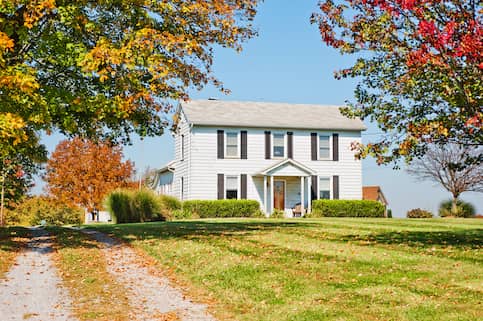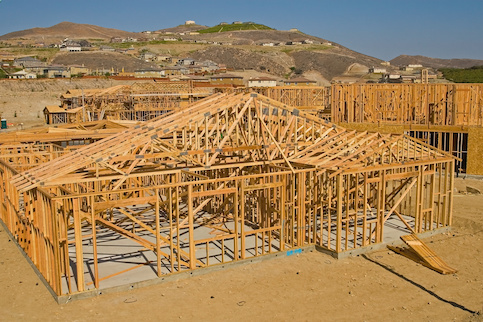If you’re a prospective homeowner in a rural area, you may benefit from a USDA loan. These loans make rural homeownership more attainable for low- and moderate-income families, providing a no-down-payment loan option for eligible homeowners living in designated rural areas. Continue reading to learn about USDA loan requirements, pros and cons, and how to apply.
Key Takeaways:
- USDA loans enable low- and moderate-income borrowers to purchase a home in designated rural areas – no down payment required.
- There are two types of USDA loans: direct loans and guaranteed loans. Each has its own eligibility requirements.
- Your ability to qualify for a USDA loan depends on your income, geographic location, credit score and the condition of the property you want to purchase.
What Is A USDA Loan?
A USDA loan (also known as a Rural Development loan) is a type of government-backed mortgage guaranteed by the U.S. Department of Agriculture (USDA) that supports rural housing markets. Because they don’t require a down payment, USDA loans provide an affordable borrowing option for borrowers looking to buy a home or refinance in a rural area. However, these loans are available only to those under certain income thresholds.
Compare Mortgage Offers From Verified Lenders:
How Do USDA Loans Work?
USDA loans are backed by the U.S. Department of Agriculture, whose intent is to make homeownership more affordable for low- and moderate-income families in rural areas. A primary benefit of this loan option is the ability to buy a home with a 0% down payment.
If you already have a USDA loan, you can refinance it into a new USDA loan; however, you can’t refinance with a USDA loan if you currently have a different loan type. Additionally, if you refinance an existing USDA loan into a new one, you can’t take cash out that’s not being invested in home improvement.
There are two types of USDA loans for prospective home buyers. Each works differently and has unique eligibility criteria.
USDA Direct Loans
USDA Direct loans are for low- and very low-income families who can’t qualify for a conventional mortgage without paying private mortgage insurance (PMI). This program provides payment assistance to reduce borrowers’ mortgage payments for a period of time. The amount of assistance depends on the family’s adjusted income.
The payback period for USDA direct loans is up to 33 years, or 38 years for very low-income borrowers.
USDA Guaranteed Loans
The USDA doesn’t directly fund guaranteed loans. Instead, the agency provides a 90% loan guarantee to lenders in case of borrower default, lowering the lender’s risk. These loans have upfront and annual guarantee fees, similar to mortgage insurance. The upfront fee is 1% of the loan amount, while the annual fee is 0.35% of the loan amount.
USDA Guaranteed loans have 30-year fixed-rate terms.
What’s Your Goal?
Buy A Home
Discover mortgage options that fit your unique financial needs.

Refinance
Refinance your mortgage to have more money for what matters.
Tap Into Equity
Use your home’s equity and unlock cash to achieve your goals.
What Are The Qualifications For A USDA Loan?
While we’ll get into USDA loan requirements in a little more depth below, here’s a high-level look at what you’ll need to qualify:
- An eligible property: The home you want to buy or refinance must be in an eligible rural or suburban area. You can use USDA’s eligibility map to find out where you can buy.
- Decent credit: Although the USDA itself doesn’t specify a minimum qualifying credit score, lenders can set their own policies. It’s not unusual to see a minimum FICO® score of 640 as a requirement to qualify.
- Income under USDA limits: You must have a household income under the limit set by the USDA for the area where you want to buy a home. These limits include all income received in the household, not just the income of the family members taking out the loan.
- Manageable debt: In general, the amount of your debt going toward your mortgage payment each month can’t exceed 34% of your gross monthly income. Your total debt-to-income ratio (DTI) must be no more than 41%.
- Appraisal: In addition to being in an eligible rural area, the property has to have standard access to utilities consistent with the rest of the community as well as road access.
Ready To Become A Homeowner?
Get matched with a lender that can help you find the right mortgage.
A Closer Look At 2025 USDA Loan Eligibility Requirements
Below, find more information about USDA loan requirements.
USDA Geographic Eligibility
USDA loans were designed to help develop affordable housing in rural areas. For that reason, USDA loans aren’t available in or around large, populated areas.
Fortunately, most areas of the country qualify for USDA loans. You can check area eligibility by entering an address into the USDA eligibility map. Orange areas on the map designate ineligible areas.
USDA Credit Requirements
The USDA doesn’t set a specific minimum credit score to qualify for a loan. That said, lenders may set their own requirements in terms of the credit score necessary to qualify for a mortgage. Many times, that score is 640 or higher.
USDA Income Limits
To qualify for a USDA guaranteed loan, your household can’t make more than 115% of the median family income. Median family income is defined as the greatest of the following:
- 115% of the U.S. median family income
- 115% of the average of statewide and state non-metro median family incomes
- The area income limit for the USDA’s housing initiatives multiplied by 1.4375
Household income includes the income of those living with you, regardless of whether they’re on the loan. The calculation is based on gross income. Fortunately, you can exclude certain expenses in the right circumstances. Categories receiving special treatment include childcare and disability expenses along with student income.
You can use the USDA’s income calculator to get an idea of whether your income qualifies for a USDA loan. You can also consult the agency’s list of income limits for individual counties broken down by family size. Below are examples from a handful of metro areas. (The USDA has different income limits for its direct loans, but these are limits for USDA guaranteed loans.)
USDA Income Limits
| Location | Current USDA Income Limits For A 1 – 4-Person Household | Current USDA Income Limits For A 5 – 8-Person Household |
|---|---|---|
| Auburn-Opelika, Alabama | $119,850 | $158,250 |
| Garfield County, Colorado | $130,250 | $171,950 |
| Springfield, Illinois | $131,900 | $174,150 |
| Ann Arbor, Michigan | $144,750 | $191,100 |
USDA Debt-To-Income Ratio (DTI) Limits
Your debt-to-income ratio (DTI) is a comparison of your monthly debt payments to your overall monthly income. When underwriting a USDA loan, lenders are required to calculate both your housing expense ratio and your total DTI, including housing and all other debts.
Your housing expense ratio is the principal, interest, taxes, insurance and homeowners association dues (PITI) payment divided by your gross monthly income. When converted to a percentage, this can’t exceed 34%.
Your total DTI is also calculated using all of your minimum monthly debt payments. This shouldn’t exceed 41% of your monthly income.
USDA Appraisal Requirements
USDA appraisals differ from standard appraisals in that the appraiser must check to make sure that the property meets USDA guidelines in addition to determining its fair market value.
Minimum Property Requirements
Appraisers use the following guidelines to make sure a home is legal, safe and livable, ensuring the property meets certain standards. For example:
- Structural integrity: The home must be structurally sound and in good repair.
- Easily accessed: The home must be accessible from an all-weather, maintained road.
- Functioning water and wastewater disposal systems: Home sites must have adequate water and wastewater disposal systems, with assurance of continuous service.
- Compliance with all zoning and building codes: A home must meet zoning and building restrictions, or it will be reported as legal nonconforming.
Home, Property And Land Disqualifications
As part of the home appraisal, the appraiser will use the following guidelines to make sure that the property is a good fit with the philosophy and aims of the USDA loan:
- Restricted location: The home must be in a qualifying rural area.
- No income-producing land: A property with land primarily used for producing, such as farmland, won’t qualify.
Take The First Step To Buying A Home
Find a lender that will work with your unique financial situation.
Pros And Cons Of USDA Home Loans
Like other loan types, USDA loans have their advantages and disadvantages. Weigh the following before deciding whether or not to apply for a loan.
Pros And Cons Of USDA Home Loans
| Pros | Cons |
|---|---|
| No down payment: With a USDA loan, you’re able to purchase a home with no down payment, making it a particularly attractive option for low- to moderate-income home buyers. | Smaller lender network: The USDA maintains its own lender network, and not all private lenders offer USDA loans. |
| Competitive interest rates: The current USDA direct loan interest rate is 5.00%, compared to a conventional loan rate of about 6.75% as of July 2025. USDA guaranteed loans tend to have lower interest rates than conventional loans, too. | Geographic eligibility restrictions: USDA mortgages are made for the purpose of development in rural areas of the country. As a result, you must buy in a rural area. |
| No prepayment penalty: A prepayment penalty is a fee charged by some lenders when you pay off your home loan early. Lenders offering mortgages guaranteed by the USDA aren’t allowed to charge a prepayment penalty. | Income limits: Your household can’t exceed the income limits in effect in your area, which disqualify those who make more than 115% of the area median income. |
| Ability to finance closing costs: The USDA allows you to finance closing costs into your mortgage as long as the total loan amount does not exceed the home’s appraised value. | Guarantee fees: USDA loans have upfront guarantee fees of 1% of the loan amount, after which the annual guarantee fee is 0.35% per year. |
| Single-unit home requirement: In contrast to most single-family home lending programs, which typically allow you to purchase homes with up to four units, you can buy only one unit with a USDA loan. |
How To Get A USDA Home Loan
There are several steps to getting a USDA home loan. Here’s a general breakdown:
- Check your eligibility. Use the USDA’s map tool to make sure you’re looking for a home in an eligible area. You should also confirm your income meets USDA requirements. Remember, eligibility requirements differ for USDA direct and USDA guaranteed loans.
- Gather documentation. Gather all necessary documentation, including W-2s and bank statements or 1099s for your entire household.
- Find a USDA-approved lender. If you’re applying for a USDA guaranteed loan, you’ll need to find a USDA-approved lender. You can find a list of lenders by state on the USDA’s website. After finding a lender, get preapproved so you’re ready to make an offer.
- Find a home and get an appraisal. After you find a home you’re interested in, submit an offer. If the seller accepts your offer, you’ll need to get the home appraised to check the safety requirements as well as the value of the property.
- Get ready to close. After the loan underwriting is finalized and you’ve had a chance to review the agreement, you’ll sign the closing documents and receive the keys.
The Bottom Line About USDA Home Loans
A USDA loan can help low- and moderate-income borrowers to purchase a home in a rural area with no down payment. However, USDA loans have eligibility requirements that consider geographic location, DTI, credit score and property condition. There are also upfront and annual guarantee fees for USDA guaranteed loans, which you should be aware of. Generally, you can pay the upfront fee as part of your loan’s closing costs or roll it into your loan principal. Annual fees will be financed into your monthly mortgage payments.
While a USDA loan isn’t for everyone, it may be worth checking your eligibility if you’re shopping for a home in a rural area.

Emily Batdorf
Emily Batdorf is a personal finance writer with five years of experience working with clients like Forbes Advisor, Yahoo! Finance, Credible, Experian and more. With a background in education, Emily loves making complex financial topics accessible to the public. She's written and edited hundreds of articles about budgeting, debt, banking and lending. In addition to writing, Emily is also a co-host of The Finance Girlies podcast, where she celebrates financial conversations among Millennial and Gen Z women.












